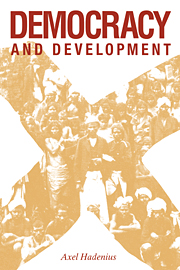Book contents
- Frontmatter
- Contents
- List of tables and figure
- Acknowledgements
- INTRODUCTION
- PART ONE DETERMINING THE LEVEL OF DEMOCRACY
- PART TWO EXPLAINING THE LEVEL OF DEMOCRACY
- 4 Introduction
- 5 Socio-economic conditions
- 6 Demographic and cultural conditions
- 7 Institutional conditions
- 8 General picture and problems of causality
- Appendices
- Notes
- Bibliography
- Index
6 - Demographic and cultural conditions
Published online by Cambridge University Press: 28 October 2009
- Frontmatter
- Contents
- List of tables and figure
- Acknowledgements
- INTRODUCTION
- PART ONE DETERMINING THE LEVEL OF DEMOCRACY
- PART TWO EXPLAINING THE LEVEL OF DEMOCRACY
- 4 Introduction
- 5 Socio-economic conditions
- 6 Demographic and cultural conditions
- 7 Institutional conditions
- 8 General picture and problems of causality
- Appendices
- Notes
- Bibliography
- Index
Summary
CLEAVAGES
If conflict is to be managed effectively, opposing camps must be willing to compromise. This implies not simple recognition of the opposition's right to hold its views and campaign for them, but also some degree of moderation in political positions and partisan identifications. Extremist viewpoints and intense attachments obstruct the accommodation and bargaining necessary for effective conflict management.
This quotation – which refers just to the democratic mode of conflict solving – expresses an opinion which is shared by many. In order to grow and to survive, it is alleged, the free government of the people must be safeguarded by a political culture which is pervaded by an elementary consent regarding the general rules of behaviour. In paradoxical terms, there must be agreement on the establishment of a system which is distinguished by dissonance and often strongly opposed wills. Despite actual conflicts, it is essential to protect even the opponents' full right to promote their standpoints. This ‘balance between unity and division, between co-operation and conflict’ – as Herbert Tingsten says – is difficult to attain. When applied, popular government has often been prone to cause division rather than promote fellowship.
According to Dankwart Rustow, it is against this background that one condition in particular must be fulfilled: democracy requires a national unity, a sense of affinity between the citizens which surpasses other loyalties. The problem is that this is frequently lacking. Many states are instead divided by deep cleavages between different population groups.
- Type
- Chapter
- Information
- Democracy and Development , pp. 112 - 127Publisher: Cambridge University PressPrint publication year: 1992



